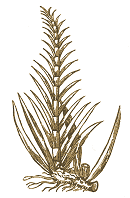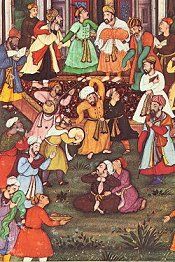Serving the Guest: A Sufi Cookbook
Essays | Recipes | Gallery

A large portion of the festive table is dedicated to sweets, in a fundamental association of sweetness of taste with the sweetness of celebration in community, and of communion with God. (Id al-Fitr is known in Turkish as Sheker Bayram, meaning "sugar festival.") The Middle East has been renowned throughout history for its tradition of patisserie and confectionery. Honey has been collected in this region since prehistoric times. and was widely used in food and as medicine. Herodotus wrote of the sweetmeats he enjoyed during his visit to Persia in the 5th century BCE. It was at this time that cultivation of sugar-cane was introduced to India; one thousand years later it was brought to the Persian Empire. Indian sugar-cane was grown in the medical botanical garden of King Khosrou; a servant of that king wrote of exquisite almond-stuffed pastries served at the Sassanian court. These pastries might have contained either honey or sugar; given the availability of a new and exotic ingredient, the court cooks might well have had the luxury of experimenting with its culinary uses.
With the spread of Islam came the spread of sugar and its popularity through all economic strata. Both sugar and honey are useful not only for sweetening and decoration, but also for preserving fruits and meat. An example of the latter use is the recipe for North African Sweet Lamb, popular during 'Id al-Adha, the Feast of the Sacrifice, when there is an abundance of sacrificial lamb in many Muslim homes.

In many Sufi tariqats, halvah or other sweets traditionally have been shared after dhikr, mirroring the sweetness of shared remembrance of God. Following dhikr at the Istanbul Qadiri dergah, pickles are served along with halvah, contrasting the pain and suffering of life with its sweetness. On other levels, such snacks probably also help to replenish energy reserves following an often vigorous physical activity, and to "ground" participants who have, through dhikr, passed into altered states of consciousness.
Throughout history Sufis have been well-known for this custom; Hakim Sana'i and 17th century Indian poets ridiculed Sufis who "worshipped" rice pudding and halvah. In the Mathnawi, Mevlana relates a story of a group of poor Sufis who took in a traveler, then secretly sold the traveler's pack-animal to pay for the expenses of a sema (turning ceremony) in his honor. A good portion of the illicit proceeds went toward the purchase of halvah.
from Serving the Guest: A Sufi Cookbook
Copyright © 1999, 2000 by Kathleen Seidel
Sources of previously published material by other authors used by permission, and print sources for images, may be found at http://www.superluminal.com/cookbook.